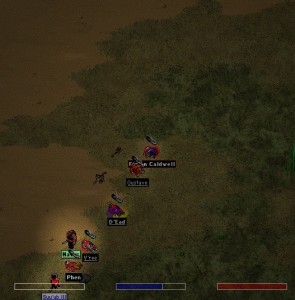So… as I posted last time, I will be speaking about how one might take an approach to studying an MMO fan community that achieves not just a balance between the critical stance of a scholar and the enthusiasm of a player, but some kind of integration of the two positions. Further, how might the voice of the community be part of that account in a more significant and participatory way than merely providing data and useful quotes?
This is even more challenging because my new job is seriously cutting into my playing time.
But I’ve taken a step in creating a blog that represents an in-character (IC) narrative of my life in the game. It’s a bit odd because I don’t usually worry about staying IC unless I’m hunting with others for whom I know that’s important. Further, in that blog I am writing about the relationships my character has with other characters; in some cases this is parallel by out-of-character (OOC) friendships, and in some cases not. Right now the line between fiction and reality has become ambiguous, when it comes to the relationships.

